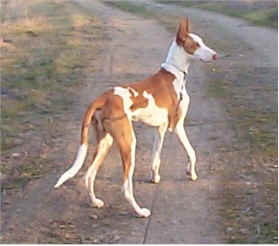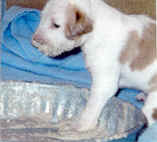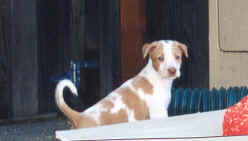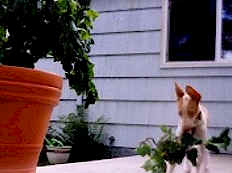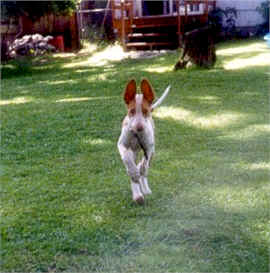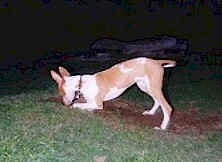Care of the Ibizan
Hound:
general considerations
|
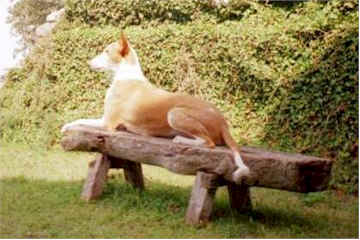
|
- A naturally clean breed, Ibizan Hounds require little in the
way of grooming, though they do shed. From puppyhood they should be touched and handled so
that grooming is a peaceful activity occurring regularly. Nails should be clipped or
ground bi-weekly, teeth scaled monthly or brushed daily. The Ibizan Hound will accept all
this without complaint if it is part of a normal routine.
- Like most sighthound breeds, Ibizan Hounds are extremely
sensitive to certain drugs. They should never be given Barbiturate
anesthetics, Rompun, or Halothane. Most veterinarians are aware of this and
choose to use Isoflurane gas as an anesthetic agent. Check with your own
veterinarian for your dog's safety. If Acepromazine is given, the animal
should be monitored carefully. Since sighthounds are more reactive to anesthesia,
the minimal amount of drug should be used for induction. Ideal surgical monitoring should
include presurgical bloodwork to assess liver and kidney function, an EKG and apnea
monitor, an IV drip, plus a technician to monitor the dog's status.
- Ibizan Hounds are also sensitive to pesticides. The safest
flea control program is one using a low-level pyrethrin-based formula. Remember that some
of the "natural" or "herbal" formulas can contain toxic chemicals, and
if used, should be administered cautiously.
- Researchers are discovering that different breeds seem to
have different dietary protein and fat requirements: what is optimal for a Malamute can
cause problems for an Ibizan or Saluki. Generally, for an Ibizan Hound, values for total
diet should be:
- fat 10-18%
- protein 21-28%
with puppies receiving the high end. Protein over 28% can
lead to skin and gut allergy-type responses ranging from mild to life-threatening. Read
labels carefully; there are high-quality foods available outside of these parameters, and
Ibizan Hounds do not do well on them. On the other hand, there even
more good quality foods that fall within this range. Some breeders feed their adult dogs
puppy food for the higher fat content with no ill effects. Check with your breeder when
making decisions about diet for your Ibizan Hound.
- During adolescence the male dog may develop a poor appetite.
His appearance may look rather alarming due to thinness, but it is important not to bribe
him or accustom him to elaborately-prepared meals or hand-feeding, as this perpetuates his
disinterest in his regular food.
- Exercise and conditioning enhance the quality of our lives
with our pets, and this also is true of the Ibizan Hound. Exercise is an excellent way to
tone down the busy activity of the young dog, and condition the adult
well into old age. Please see Canine Sports for
some excellent reference material on how to develop a routine appropriate for you and the
life stage of your dog.
- Because of low body fat stores, it is important to provide
your Ibizan Hound with a well-padded bed or crate. Initial training for sits and downs
should be done on soft surfaces (a reluctance to lie down on command usually is not a
reflection of dominance, but of discomfort). For the same reason, he should be provided
with an appropriate blanket or coat during cold weather.
|
|
Suggested
Resources for the Puppy Owner:
|
Books:
|
|
Sites to check out:
|
Most Important Resource of all:
|
|
|
